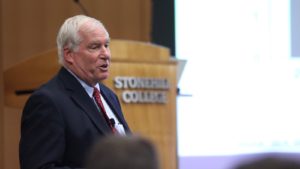The Federal Reserve’s inspector general has concluded that financial trades made several years ago by former Federal Reserve Bank of Boston President Eric Rosengren did not violate any laws or ethics rules.
At the same time, a report Inspector General Mark Bialek released this week found that stock trades Rosengren engaged in during 2020 created the appearance of a conflict of interest “that could cause a reasonable person to question Mr. Rosengren’s impartiality.”
Rosengren and and former Federal Reserve Bank of Dallas President Robert Kaplan were investigated at the same time as Fed Chair Jerome Powell and former Vice Chair Richard Clarida, who were also implicated in press reports of similar investment trades in the summer of 2021. Both Powell and Clarida, who also resigned in the wake of the reports along with Rosengren and Kaplan, were cleared by Bialek’s office in the summer of 2022.
In Rosengren’s case, he made – and in some cases failed to properly report – a number of trades involving call options for stocks of for real estate investment trusts and the stocks themselves, Bialek’s office said. In addition, the report said, he made significantly more trades involving his holdings in Invesco Mortgage Capital, Two Harbors Investment Corp., AGNC Investment Corp. and Annaly Capital Management in 2020 than in previous years.
The report notes that Federal Reserve ethics officials reviewed the trades Rosengren had reported and did not flag issues. The report quotes an unnamed Fed official who related an anecdote that Rosengren “characterized his trading in REITs during a time when the Federal Reserve authorized the purchase of agency [mortgage-backed securities] as a ‘blind spot'” during a 2021 meeting with him about the trades following media reports of his dealings.
After the trades were revealed in September 2021, Rosengren announced that while he believed he had not broken any rules or laws, he realized the trades “generated some questions” about conflict of interest.
“I have made the decision to divest these assets to underscore my commitment to Fed ethics guidelines. It is extremely important to me to avoid even the appearance of a conflict of interest, and I believe these steps will achieve that,” he said in a statement to the media.
Later that month, he resigned from the Boston Fed citing ill health after nearly 40 years in various roles at the institution. He joined the Berkshire Bank board of directors in the spring of 2023 and a visiting scholar at the MIT Golub Center for Finance & Policy. He was replaced as head of the Boston Fed by current bank President Susan Collins, an economist, former top University of Michigan administrator and the first the first African-American woman in the post.
The Inspector General report said that because Rosengren and the Dallas Fed President Robert Kaplan’s stock trading did not violate the Federal Reserve’s ethics rules at the time or federal conflict-of-interest laws, investigations into the two men were closed.
However, the report criticized those same ethics rules, saying they “did not sufficiently support public confidence in the impartiality and integrity of the policymakers and senior staff.”
The Federal Reserve’s board of governors implemented new ethics rules governing stock holdings and trading that went into effect in the summer of 2022. The new rules bar top Fed officials and staff from investing in stocks, bonds, cryptocurrencies or commodities, along with industry-specific mutual funds and require providing over a month’s advance notice of attempts to buy and sell securities and impose a 30-day deadline to report a transaction.







